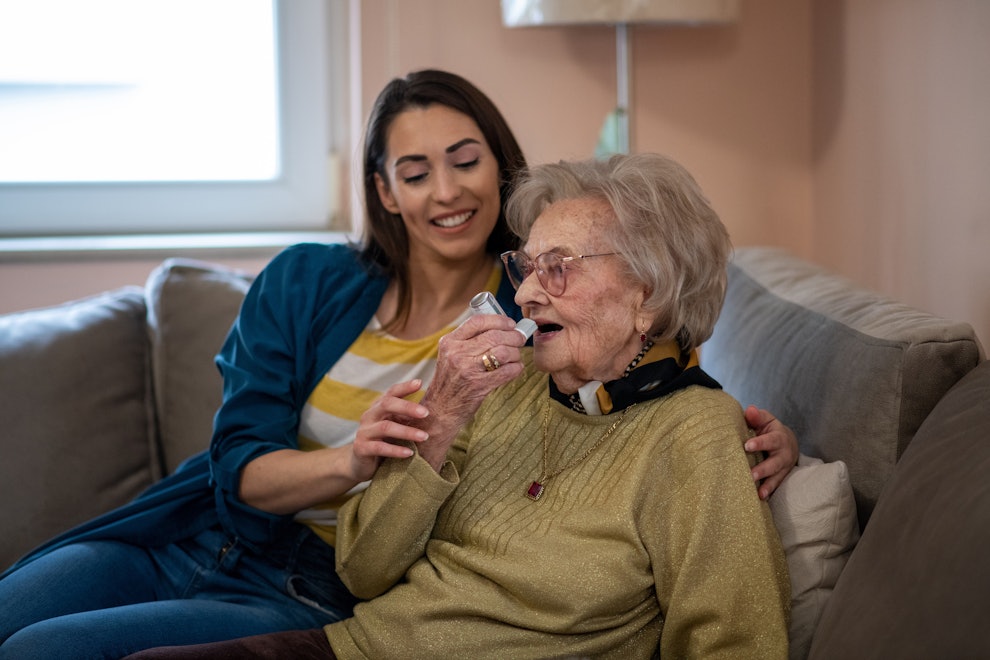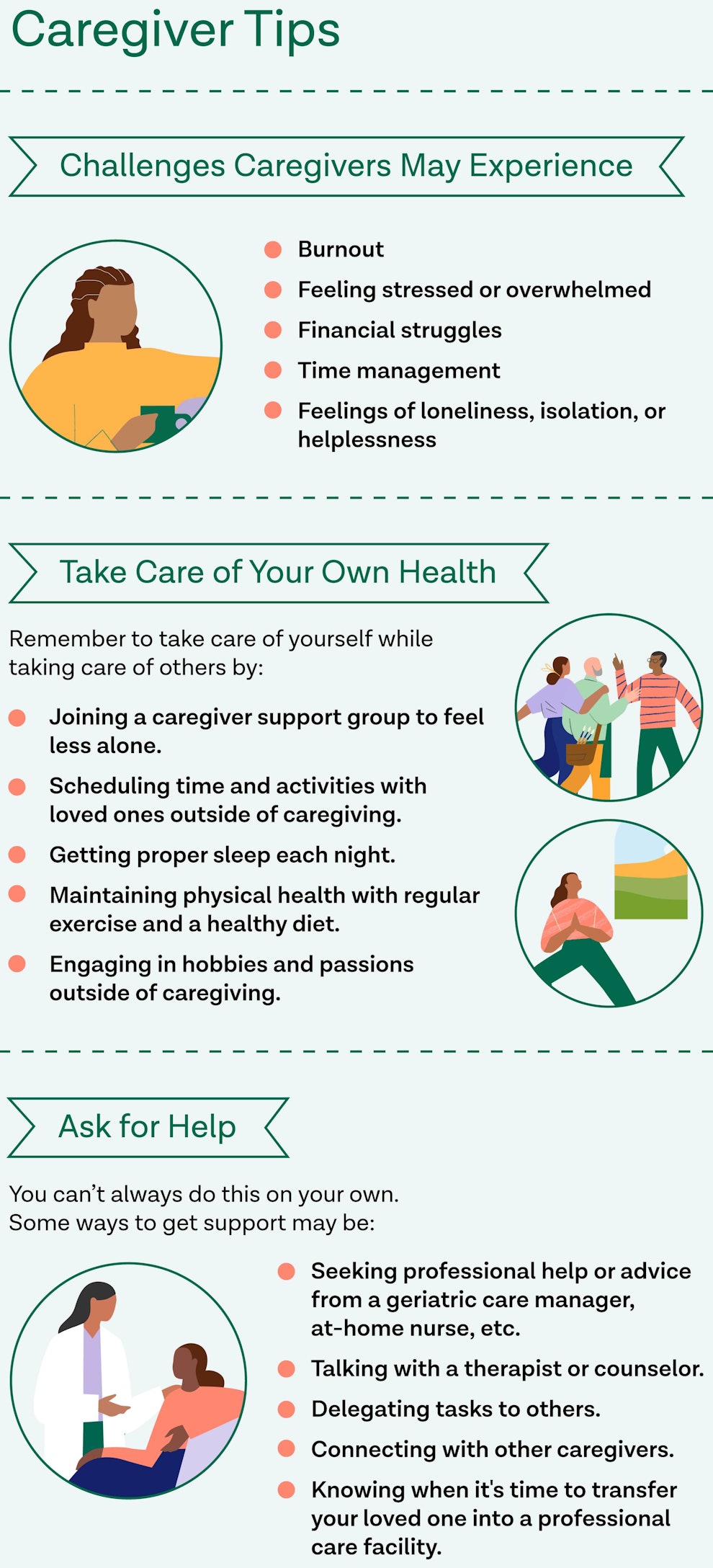Caregiver Tips: How To Care For Yourself When Taking Care Of Others
Article at a glance
- Many older adults require care as they age, and up to 15 million Americans provide unpaid care for an older person.
- Caregiving can be worthwhile but can also be stressful, especially without help.
- There are many different support groups and resources to assist caregivers.

As adults age, certain medical conditions and illnesses may arise that require additional attention and care to keep them healthy. Caregivers are those who step in to help senior adults who may have difficulty, in one or more ways, taking care of themselves.
While caregivers are responsible for a great deal of care, the pressure can be immense and overwhelming, especially in long-term care situations. However, there are ways that caregivers can ensure they are properly taking care of themselves and those they are caring for.
What Is Considered Caregiving?
There are a few different ways that a person can provide care, including providing emotional support, medical assistance, and more.
Emotional Support
Dealing with the struggle of illness and age can be an emotional experience, and caregivers can provide support in this area in a few ways, such as:
- Providing encouragement
- Reminding them that they are needed/valued
- Encouraging mental stimulation (such as playing board or card games, engaging in meaningful conversations, learning a language, etc.)
- Listening to/validating their feelings when possible
Physical Support
Whether due to age or a medical condition, a person you’re caring for may experience difficulty with mobility and may require physical support, including:
- Assistance with getting around the home
- Cooking meals or signing them up for home-delivered meals
- Assistance with hygiene, such as brushing teeth or showering
- Providing transportation help by driving
Medical Assistance
While many caregivers aren’t necessarily healthcare professionals, there are still ways they can provide medical care and support, including:
- Driving to and from doctor appointments
- Scheduling medical or hygienic appointments such as physicals, haircuts, etc.
- Helping to fill/pick up medications and ensuring they are taken
- Advocating on a person’s behalf at medical appointments/supporting the person as they advocate for themselves by taking notes throughout the appointment, making a list of notes the patient wants to address with the provider, etc.
Financial Assistance
In some cases, caregivers may also provide financial assistance, including:
- Helping to pay for basic needs (food, clothing, etc.)
- Assisting with medical bills/expenses
- Paying for a nursing home/assisted living facility

Types of Caregivers
Caregiving can be approached in different ways depending on the circumstance, but overall there are two types of caregivers.
Informal Caregivers
Informal caregivers are unpaid people who help to provide care. These individuals are often close to the person receiving care, and include:
- Family members, like a spouse or adult children
- Friends
- Neighbors
Informal caregivers may live in the home, live nearby, or even live long distance from the care recipient. In most cases, these types of caregivers provide care in the care patient’s home.
Formal Caregivers
Formal caregivers are individuals providing care in a formal setting, and include:
- Paid employees or volunteers from a service provider
- Caregivers in assisted living communities
- Caregivers in nursing homes
Formal caregivers provide care in specific settings such as assisted living facilities and nursing homes, but can also provide care in a patient’s home.

Challenges of Caregiving
While those who provide care may find it worthwhile to do so, this doesn’t mean there aren’t difficulties or struggles as a caregiver. Some examples of difficulties a caregiver may experience might be:
Experiencing Burnout: whether physical, mental, emotional, or all three, it’s not uncommon to experience caregiver burnout, especially in long-term care situations.
Feeling Stressed: especially if the patient is a loved one, caregiving can cause physical and emotional stress, sometimes referred to as caregiver stress. This can happen regardless if they are new caregivers or have provided care for a longer period of time and can result in stress-induced conditions such as high blood pressure.
Struggling With Financial Implications: while some may be able to provide financial support easily, others may struggle with the resources to consistently and properly care for the recipient.
Managing Their Time: caregiving can often take up a large amount of time and attention, leaving less time for other aspects of the caregiver’s life.
Fear of Asking for Support: caregivers can often become overwhelmed yet feel guilty about asking for help or support from others. This can lead to depression or even isolation if they choose not to seek help from others.

Self-Care Tips for Caregivers
It can be difficult to navigate being a caregiver, and at times can lead to a caregiver neglecting themselves in the process. There are a few ways a person can still take care of themselves while being a skilled, helpful caregiver to others.
Asking For Help
Asking for support can be difficult to do, but a person isn’t meant to handle everything by themselves. Reaching out to neighbors, friends, and other family members to help out can relieve some stress and pressure. Some ways to ask for support include:
Seeking Professional Help or Advice: especially if you’re new to caregiving, it can be hard to know where to begin. reaching out to a geriatric care manager can help answer questions and connect you to resources that can be beneficial in navigating being a caregiver.
Caring For Mental Health: Caregiving can cause strain on one’s mental health. Seeing a therapist or clinical psychologist to talk about struggles and hardships can be a way for caregivers to care for themselves as they care for others.
Delegating Tasks to Others: asking a family member or other relatives to help out with grocery shopping, household chores, or laundry can make a difference.
Connecting With Other Caregivers: connecting with other caregivers, especially those in similar situations, can help immensely with the guilt and isolation that caregivers may experience.
Deciding When It’s Time to Transfer: choosing to place a loved one in the care of someone else is not an easy decision. However, it’s important to know when it’s time for your loved one to move to a nursing home, seek respite care, or get assistance from a formal caregiver like a medical professional.

Taking Care of Your Own Health
Caregivers spend a great deal of time ensuring that the patient’s health and well-being are a priority, but that doesn’t mean they shouldn’t take of themselves. Outside of asking for help, some ways to care for your own well-being and health include::
Joining Support Groups: there are caregiver support networks and groups that can provide emotional support and assurance and make caregivers feel less alone. Some support groups may be aimed at caregivers caring for those with specific conditions, such as Alzheimer’s disease or dementia, which can give targeted support. For more information on help for Alzheimer’s caregivers, visit this source.
Spending Time with Loved Ones: schedule time and activities that allow you to spend time with others that aren’t centered around caregiving.
Getting Proper Rest: don’t neglect your sleep or try to go days without proper rest—it’s not only important to your well-being, but lack of sleep can make caregiving difficult. For more advice on why sleep is important and how to improve your rest, visit this source.
Exercising/Eating Well: just like sleep, exercise and eating well also have a tremendous impact on your overall health. keeping yourself physically active—whether through exercise or by engaging in activities—and eating healthy foods will help you to feel your best. To learn more about staying physically active, visit this source. To learn more healthy eating tips, visit this source.
Keep Up With Your Health: Caregiving can make it easy to forget about your own health. Ensure you are staying up to date with your own medical appointments or medications that you need to manage any health concerns you have.
Exploring a Hobby: it’s important to still have a life outside of caregiving—making time for hobbies and other activities you love, even for a few hours as it can be crucial to your mental health.

Resources for Caregivers
There are resources that can be extremely helpful to caregivers, whether you are struggling to be an effective caregiver or need information to help in the process.
Family Caregiver Alliance
Family Caregiver Alliance is specifically targeted at helping caregivers. They provide resources and tools to aid caregivers across a wide variety of areas, including tips, connections to support groups, and more.
Note: You can learn more about Family Caregiver Alliance by visiting their website here.
National Institute on Aging
The National Institute on Aging provides valuable information to caregivers. They have resources regarding long-term care planning, how to care for someone long-distance, how to care for those with Alzheimer’s disease, and more.
Note: You can learn more caregiving tips from National Institute on Aging on their website here.
Eldercare Locator
This tool from the U.S. Administration on Aging provides services specifically for older adults and caregivers/families, including transportation, housing, health, and more. This can help you find local area agency programs and resources offered in your area.
Note: You can visit the website for Eldercare Locator here.
Family and Medical Leave Act
For eligible employees, the Family and Medical Leave Act (FMLA) allows for unpaid leave to care for a family member with a serious health condition. The length of leave allowed and qualifying health conditions vary depending on the circumstances, but qualifying for the leave can allow extra time to focus on caregiving without becoming overwhelmed with work responsibilities.
Note: You can learn more about FMLA here.
FAQ
What is the hardest part of being a caregiver?
Caregiving can bring many challenges. Some of the most common difficulties surrounding caregiving include stress, financial implications, and feelings of isolation.
What are 3 symptoms of caregiver burnout?
Some symptoms of caregiver burnout may include feelings of hopelessness, sleep deprivation, and neglecting personal physical or mental health.
Sources
- https://www.cdc.gov/healthliteracy/developmaterials/audiences/olderadults/tipsforcaregivers.html
- https://www.cancer.net/coping-with-cancer/caring-loved-one/tips-being-successful-caregiver
- https://www.nia.nih.gov/health/caregiving
- https://www.nia.nih.gov/health/frequently-asked-questions-about-caregiving
- https://www.nia.nih.gov/health/infographics/make-yourself-priority-too-tips-caregivers
- https://www.nia.nih.gov/health/when-its-time-leave-home
- https://www.nia.nih.gov/health/doctors-appointments-tips-caregivers
- https://www.heart.org/en/health-topics/caregiver-support/top-10-caregiver-tips-for-staying-healthy-and-active
- https://www.asccare.com/the-challenges-facing-a-family-caregiver/
- https://www.cdc.gov/aging/caregiving/caregiver-brief.html




